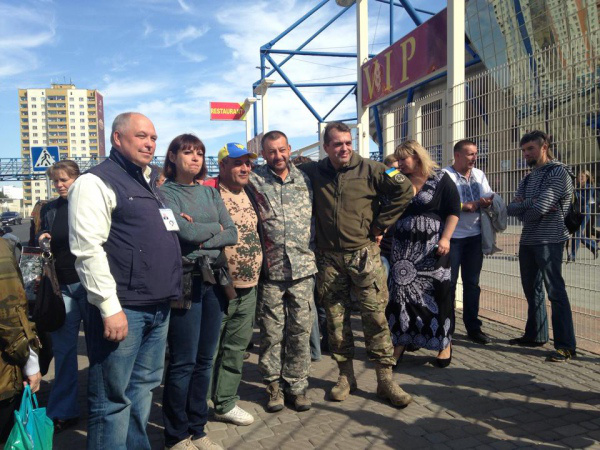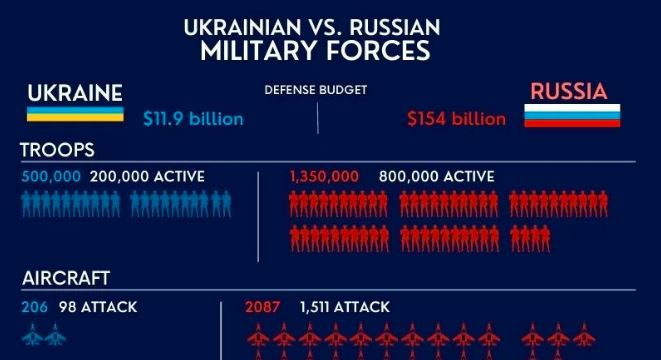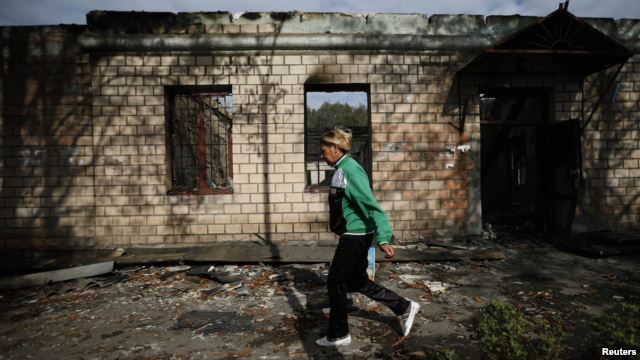[hr]Cover photo: left to right: Oleh Khomenko, Tatiana Rychkova, Armen Nikohosian, Vitali Holubko, and Iuri Biriukov.
Anyone who is following the war in eastern Ukraine knows of Armen Nikohosian, the Ukrainian-Armenian who performs surgery on wounded soldiers in eastern Ukraine. In the last five months Nikohosian has been home in Kyiv a total of two times. His wife and children live in Kyiv. But Armen’s real home is wherever the war is.
Among volunteers he is a star on the level of amongst others Uri Biriukov [founder of the volunteer network “Wings of the Phoenix.” The network has generated over 50,000,000 UH in donations for the Ukrainian Armed Forces], Tania Rychkova [organized the Dnipropetrovsk arm of “Wings of the Phoenix;” helps in raising funds and in delivering supplies to the soldiers], and Uri Kasianov [one of the founders of “Army SOS” a volunteer group made up of mostly IT specialists-volunteers who besides supplying the soldiers with sophisticated military gadgets are hard at work manufacturing their own drones].
He is well known among the militant separatists, too: they frequently let him pass through DNR and LNR checkpoints.
He has been home in Kyiv only twice in five months. His wife and children live there, but Armen says his real home is where the war is.
“Home is wherever I am at the moment, with the guys,” he says, meaning with the soldiers of the Ukrainian Armed Forces and soldiers of the volunteer battalions, all of whom he treats. “When someone calls and asks me where I am, I tell them I’m home. And by now everyone understands that home for me means at the front.”
There was a moment in Armen’s life when he felt he had to relocate to a home he secretly carries within him, his private, inner home where in place of a soft bed and meals cooked by his wife a ditch serves as his bed, the sound of gunfire is the morning alarm and army gruel is his food.
Nikohosian is an experienced doctor who for three and a half years worked under contract as the chief of surgery in a polyclinic at the Gazprom manufacturing plant in northern Russia.
He has lived in Surgut, Tyumen and Salekhard and has saved the lives of people who have dangerous jobs. Patients love and trust doctors like Nikohosian: his confidence, calm demeanor and cheery disposition incite feelings of goodwill and friendship.
When Maidan burst onto the scene in Kyiv, Armen abandoned his contract with Gazprom, quitting his job to return home to Kyiv. “I couldn’t just stand by and watch my country in a time of trouble.” Ever since, he has been an unemployed volunteer who is being provided for with clothing, food, and a place to sleep by his countrymen whom he is serving.
“Today it seems volunteers are more important than a president is,” jokes Nikohosian. “If I were president, I would be spat at, but as a volunteer medic people value and appreciate me. Everyone knows that in today’s circumstances volunteers are doing more than what government deputies are doing.”
“In the first three months of the Anti-Terrorist Operations we retrieved the wounded from the field of battle ourselves,” Nikohosian says.
Together with Vitali Holubko, a medic from Dnipropetrovsk, Nikohosian worked at the Maidan for three months in a medical center they themselves had set up. In the beginning Nikohosian treated the wounded in the House of Books on Hrushevskoho Street, and then later, when the medical personnel were chased out by the Berkut thugs, they set up operations in the Professional Building. After that building was set on fire the medics moved to St. Michael’s Cathedral and Nikohosian operated on the wounded in a varenyky (filled dumpling) restaurant next to Hotel Kozak. The owner of the establishment made several rooms available for the needs of Maidan. Surgery was performed on the tables in the restaurant.
After things on the Maidan quietened down Armen was appointed head doctor at Mezhyhiria but he did not stay there long. By May 1st he had left for the ATO (Anti Terrorist Operation) zone close to Sloviansk with the first battalion that was formed after the Maidan, the National Guard Battalion.
“I left for the eastern region on my own. I knew that doctors there were in short supply,” explains Armen. “Relying on the Ministry of Defense was hopeless. Now, when things have more or less been stabilized, a number of medical brigades have been deployed to eastern Ukraine, but in the first three months we retrieved the wounded from the field of battle ourselves. The only help we had was from the volunteers and the locals.”
Armen admits that at first it was difficult. In comparison to the Maidan, the situation in eastern Ukraine turned out to be much harder and far more dangerous. When he got there, Nikohosian realized that he was in the midst of a real war, not just in an anti-terrorist operation.
“The hardest day was the 5th of May, our first day of arrival, when we hadn’t yet become a part of the pulse that was beating there,” Armen recalls. “Many of our boys died on that day. The few ambulances that were available to us could not handle all the wounded so we transported up to eleven men per vehicle in private cars out of the zone just outside of Sloviansk. These days we take shifts in all the hot spots to make sure no soldier is left without help. And to help we sometimes have to work under fire.”
“Even here, in eastern Ukraine I make use of Ukrainian-themed decorations. After all, I’ve come to another part of Ukraine here, not to Russia.”
Armen Nikohosian has his own “company” ambulance that no other ambulance can compete with: a decal of a ribbon embroidered in the Ukrainian style stretches across the entire body of the vehicle and the words “Volunteer Medical Service” are painted on it in bold block letters.
The ambulance was purchased for Armen with funds that were donated, as is common nowadays, via Facebook: responding to a campaign called “People Support” the public contributed around $15,000. The money was used to pay for the vehicle and all the necessary medical equipment needed to equip the ambulance. Another ambulance just like this one was donated. The second ambulance is used by supplementary medical personnel, friends of Nikohosian, who help in times and places of especially fierce fighting, when one ambulance is not enough.
Little Ukrainian flags adorn the interior of the ambulance. Nikohosian is never without his blue and yellow cap with the trident and a blue and yellow ribbon on it. It is hard to believe that the DNR rebels let him pass through their checkpoints without a problem, with all those Ukrainian emblems and decorations plainly in sight. Their attitude, most likely, is to shrug it all off as “cute trash.” Yet Armen has never been taken prisoner. And his work has not been interrupted.
“There are fighters among them who do have a code of honor, who are not cold-hearted, who do the shooting just to make 200-300 UAH. And they understand that access to medicine is vital in war, they understand what it is I do,” Nikohosian explains. “A lot of them know about me from the internet…I travel unarmed, they have no reason to bother me. What would be the sense in taking me prisoner? When they do approach me and threaten me, they sense that I am a strong, not broken man, and they see no point in putting me away just for my patriotism.”
“What do you talk about with them when you do cross paths?”
“What do I say?… in my own way,” Armen says in a clever yet uneasy manner, “I remind them that I am in Ukraine and that’s why I have Ukrainian symbols on me – I’m not in Russia. As to why do they let me through? They probably think….”
Armen does not wear a helmet or a bulletproof vest when he is in the battle zone. When asked why, he responds, jokingly at first, that nothing fits him, and then later in all seriousness he adds, “If I am destined to die by a bullet, I will die by a bullet. And if I am destined to drown… there is no guaranteed protection from anything, anywhere.”
Nikohosian is synonymous with calmness, poise and steadiness. Smiling the same unchanging smile he stresses that he has never felt extreme emotion or anxiety. The only thing that disturbs him nowadays is, as he puts it, “the indifference of the government.”
“It seems like the authorities don’t care whether we fight or not, whether the country stays united or not,” Armen reflects. “From their high positions they exclaim that the army is well supplied. But they are addressing folks who refuse to listen to lies, we are well aware of what the army has and what the army does not have. If it wasn’t for the volunteers… you understand. Neither the Ministry of Health, nor the Ministry of Defense have provided a single tablet for the army. That is what alarms me. What do we need the Parliament for then? For them just to sit there in their comfortable seats and receive a salary and privileges? All we still lack is weapons, and once we get the weapons we will no longer have to be reliant on the government…”
“I keep a grenade in the door pocket of my vehicle in case I have to kill myself.”
“Most of the medics who are volunteering in eastern Ukraine have gone through the Maidan,” says Nikohosian. “And those who stayed in their offices have remained in their offices and take bribes. They couldn’t care less that there is a great need for emergency physicians and surgeons. They say, ‘Why should I go? I have a family to take care of.’ And what about us, it’s as if we don’t have families, it’s as if we were from another planet, as if we are immune to bullets, and they’re not.”
“How do you treat those medics who support and work for the DNR? A medic should be without prejudice or bias,” I challenge Armen, sensing that I have touched on a sore spot.
“A medic is responsible for helping the wounded, but not if the wounded is a terrorist,” he proclaims. “Do you understand?”
“No. A wounded soldier is a wounded soldier. What about the Hippocratic Oath? Plus how do you tell the difference between a terrorist and a plain separatist?”
“There was an incident in which I failed to help a separatist,” Armen recalled. “This separatist and his friends shot up a KAMaz using a grenade launcher and ripped apart a nineteen-year-old kid right in front of my eyes. Our guys caught them, brought them to our headquarters, beat them up, and then came up to me and asked me to bandage them up. I refused. At that moment I didn’t care that I was going against regulations. I witnessed that boy being ripped apart. Those separatists kill innocent people. I could understand it if it had happened in the course of a battle. But they did it without any warning! If they were professional soldiers and not heartless drug addicts who after being let out of prison received weapons, then I would have given medical aid.”
And Armen does not consider as colleagues those medics who help the terrorists and leave the wounded soldiers in the hands of the DNR.
“That is predatory behavior,” he says. “The same kinds of things happened on the Maidan, when the wounded were brought to hospitals and the doctors there handed them over to the police. That, too, was horribly cruel: people were abused, beaten, and killed.”
Every day Armen pulls Ukrainian soldiers out of the most dangerous situations and more often than not operates on them right there on the spot. The volunteer doctor puts his life at serious risk every day, crossing the front line in his patriotic vehicle. He claims that he is afraid of nothing.
“I have told everyone that I will not be taken prisoner,” Nikohosian states sternly. “I have a grenade in the door pocket of my vehicle. If anything happens I will kill myself and anyone who might be approaching. Why would I want someone’s life to be at risk because of me? Everyone knows that I go through Ukrainian checkpoints without a problem, the militants (DNR and LNR terrorists) can take advantage of that. I would rather kill myself and them rather than betray my compatriots. My reputation means a lot to me.”
“So much that you would give your life to protect it?”
“Of course! Why not?” Armen responds calmly. “What difference does it make how you die? People will understand my deed. If it mattered, I would be wearing a bulletproof vest and a helmet and I would be driving a bulletproof ambulance. You know, one should live life honorably. Lions die once and scaredy cats die hundreds of times.”







